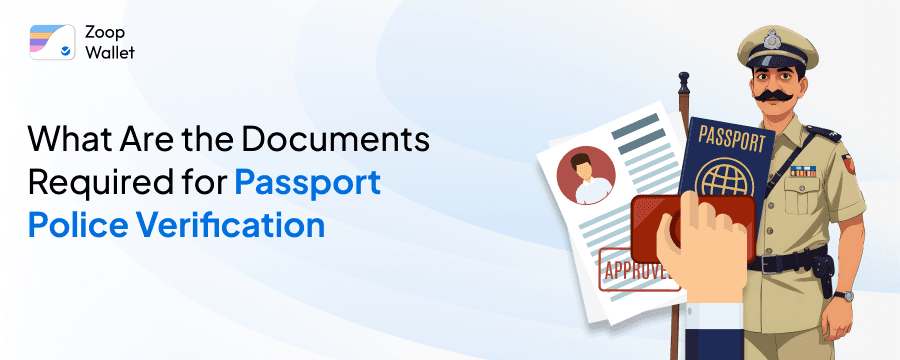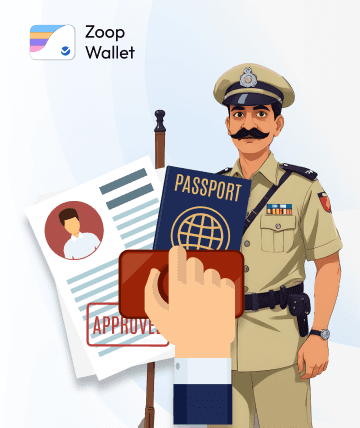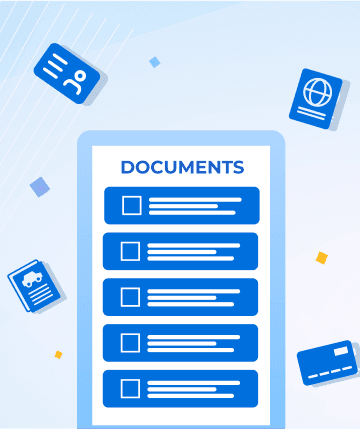Identity
Oct 30, 2024
What are the documents required for passport police verification?
Geetika Panwar
Content Writer
Obtaining an Indian passport is a significant step for any citizen, opening doors to global travel for business and leisure. Issued by the Ministry of External Affairs of India, passports facilitate easy access to numerous countries, allowing for visa-free travel or visas on arrival. However, before you can hold this essential document, your application must pass through several key steps, one of which is the passport police verification.
The passport police verification process is a crucial component of the application journey. During this stage, local law enforcement visits the residential address provided in your application to confirm your identity and residence. This verification is essential for ensuring that the information you have submitted is accurate, thereby safeguarding the integrity of the passport issuance process. To navigate this phase smoothly and avoid any delays, it’s imperative to prepare the necessary documentation meticulously. In this article, we will explore the passport police verification documents required and provide insights into the overall passport police verification process.
Types of Police Verification for Indian Passport
When applying for an Indian passport, understanding the passport police verification process is crucial. There are four main types of police verification applicable to different scenarios:
1. No Police Verification Required
In certain cases, applicants may qualify for a status where no police verification is required. This typically applies to individuals employed by government organizations, public sector undertakings (PSUs), or statutory bodies. To benefit from this waiver, these applicants must submit an "identity certificate" using Annexure “B” alongside their passport application documents. Additionally, holders of diplomatic or official passports are also exempt from the police verification process, provided they submit the required Annexure “B” documents.
2. Pre-Police Verification
The most common type of verification is pre-police verification. In this process, the verification occurs before the passport is issued. Applicants must complete their passport application and submit the necessary documentation, after which the local police station within their jurisdiction will initiate the identity verification. A police officer will visit the applicant's residence to confirm the details provided in the passport application, including both address and identity proof. If everything checks out, the police station will clear the application, allowing for passport processing to continue. Once approved, applicants can expect to receive their passport within 3 to 5 days.
3. Post-Police Verification
In contrast to pre-police verification, post-police verification occurs after a passport has been issued. This process is often applicable in urgent situations, such as for tatkal (urgent) passport applications, or for passports granted to government officials and diplomatic passport holders. In these cases, the verification process ensures that the identity and address provided remain valid even after the passport has been issued.
4. Post Police Verification with Aadhaar
The Ministry of External Affairs (MEA) has introduced a streamlined approach for post-police verification of passport applications, aimed at enhancing the overall efficiency of the verification process. Candidates wishing to benefit from this provision must present specific documents, including an affidavit along with their Aadhaar card, voter ID card, or PAN card, as outlined in Annexure E.
However, it's important to note that individuals with any criminal background are ineligible for this service. For those who utilize their Aadhaar number as a form of identification, the validation process is crucial. If the Aadhaar card verification is successful and all other supporting documents are in order, applicants can expect to receive their passport promptly.
This initiative underscores the significance of Aadhaar in the passport application process, ensuring a smoother transition from application to issuance while maintaining stringent security measures. By leveraging the unique identification provided by Aadhaar, the MEA aims to facilitate quicker and more reliable passport processing for eligible candidates.
Online Passport Police Verification Process
In line with the Digital India initiative, the Passport Seva has launched an innovative online passport police verification process designed to expedite passport applications. A key component of this initiative is the mPassport application, which serves as a digital tool for police verification of passport applications, available on both tablets and computers. This allows applicants to apply for their passports conveniently through the Passport Seva portal or via the mPassport mobile app.
Steps to Submit an Online Police Verification
Register on the Passport Seva Portal: Begin your journey by creating an account on the official Passport Seva online portal.
Login to the Portal: Once registered, log in to your account and navigate to the section that allows you to apply for a Police Clearance Certificate.
Fill in the Application Form: Carefully complete the application form with all required details, ensuring accuracy for a smooth verification process.
Pay and Schedule an Appointment: After submitting the form, click on the "Pay and Schedule Appointment" option available on the "View Saved/Submitted Applications" screen. Make the necessary payment to confirm your appointment.
Application Receipt: Upon successful payment, you can either print the application receipt or wait for a confirmation SMS. This SMS can be presented at your appointment as proof of application.
Visit the Passport Seva Kendra: On the scheduled date, visit the designated Passport Seva Kendra with all the necessary documents in hand.
This online passport police verification process not only simplifies the application procedure but also enhances the efficiency of passport issuance. By embracing technology, the Passport Seva ensures that applicants can complete their verification swiftly and securely.
Documents Required for Indian Passport Police Verification
When applying for an Indian passport, it's essential to prepare the necessary documentation to facilitate the passport police verification process. Regardless of whether you are applying for a regular, diplomatic, or official passport, the following documents are crucial to establish your identity and address.
New Passport Application Documents
To ensure a smooth police verification process, you must submit the following documents when the police conduct their verification at your residence:
Address Proof:
Water Bill
Electricity Bill
Rental Agreement
Identity Proof:
Birth Certificate
Aadhaar Card
PAN Card
Ration Card
Affidavit: A sworn statement may be required to affirm your identity and address.
2. Passport Re-issue/Renewal Documents
For those seeking to renew or re-issue their passport, the following documents are necessary:
Old Passport: The original passport must be presented.
Self-attested Photocopies of:
The first two pages and the last page of your passport, including the identification and address pages.
The ECR/Non-ECR page.
The page containing information about any validity extensions.
The observation page, if applicable.
No Objection Certificate (NOC) or Prior Intimation Letter (PI): Required for certain applicants, especially if previously issued a passport.
Having all the required documents prepared will ensure a smooth passport application process, helping you get through the passport police verification efficiently.
Organize Your Documents with Zoop Wallet
To streamline the management of your important documents, consider using Zoop Wallet. This online document storage solution allows you to keep all your essential papers in one place. With features like a document organiser wallet and the ability to save documents online, Zoop Wallet acts as an efficient document store app for all your verification needs. Transitioning to a digital format means you can access your files anytime, anywhere, enhancing the convenience of the passport application process.
Whether you’re managing personal or professional documents, Download Zoop’s documents Wallet app for iOS and documents wallet app for android, ensures that everything is organized and protected in a secure environment.
How to Check Police Verification Status for Passport
When you submit your application for a passport, the passport police verification process plays a critical role in determining your eligibility. The police issue various statuses during this verification, which provide insight into the progress of your application. Here are the key verification statuses you might encounter:
Verification Status Types
Clear: This status signifies that the police have completed the verification process and found no issues. It indicates a clean record for the applicant, meaning there are no pending criminal cases.
Adverse: An adverse police verification status means that there were discrepancies in the information provided during the verification process. This could occur if the applicant submitted a false address or has unresolved criminal charges. In such cases, the passport may be withheld or revoked until the issues are resolved.
Incomplete: If the verification process is halted due to insufficient documentation, the status will be marked as incomplete. This can happen if the police report is not properly filled out or if the applicant has lived at their current address for less than a year without providing evidence from previous addresses.
Upon completion of the police verification, a report is generated that dictates whether the passport will be approved or rejected. If you receive an adverse or incomplete remark, you can visit the police station that issued the report for clarification and resolution.
Addressing Adverse Police Verification
If your passport application has been delayed due to an adverse police verification, here are common reasons and how to address them:
False Address Submission: If the police find that your application contains incorrect address details, they will flag it as adverse. If you were temporarily unavailable during the verification, you can request a re-verification by contacting the Regional Passport Office (RPO) with your file number.
Pending Criminal Cases: Current or unresolved criminal charges can lead to the refusal of passport issuance. If your criminal matters have been resolved, present a copy of the court order to the RPO and request a re-verification.
In any case of delay, reaching out to the RPO with your file number can provide insights into the reasons for the holdup and guide you on necessary actions.
Handling Incomplete Police Verification
If your status shows incomplete, it may stem from several factors:
Short Residence Duration: If you’ve lived at your current address for less than a year, the police may need verification from all previous residences. Failure to provide sufficient proof may result in an incomplete report.
Improperly Filed Reports: If the police do not file the verification report correctly, it may be returned to them for completion.
Insufficient Documentation: If the verifying officer does not collect enough evidence to substantiate your current residence, the report will remain incomplete.
Exceptions in Police Verification
Certain exceptions exist within the police verification process for passport applications:
If you apply for a new passport before your existing one expires, police verification may not be necessary, provided you submit a no-objection certificate (NOC) and relevant reports.
Government employees may bypass police verification by presenting an “identity certificate” through Annexure B.
Holders of diplomatic or official passports are exempt from police verification altogether.
Understanding these aspects of the police verification documents for passport applications can help streamline your passport acquisition process. By ensuring you have the correct documentation and following the procedures, you can facilitate a smoother experience.
FAQ’s
1. Do police officers charge for passport verification?
No, police officers do not charge any additional fees or processing charges for passport verification. All associated costs are included in the application fees.
2. Is police verification mandatory for all passport applications?
Not all passport applications require police verification. Government employees and holders of diplomatic passports are exempt from this requirement.
3. Can police reject my passport verification?
Yes, in certain situations, your passport application may be marked as adverse or incomplete. Common reasons include address mismatches or failure to fulfill required criteria. It’s crucial to follow all application steps and provide accurate documentation.
4. Will I be notified before the police verification takes place?
Typically, you will receive a notification via SMS or email informing you that the police will visit your residence to verify your address and identity proof. Ensure you are available during this visit to expedite the process.
5. Is police verification required for a new passport if I’ve changed my address?
Yes, any changes to your name, address, or personal details in the passport necessitate police verification.
6. What happens if my police verification fails?
If your police verification fails, you may receive an adverse or incomplete status. Your application may be canceled or withheld while further information is gathered, or you may need to update your address or identity details.
7. What if I miss my police verification appointment?
If you miss your appointment, immediately contact your local police station or the Passport Seva Kendra to request a follow-up visit. Failure to do so may result in your application being marked as incomplete or canceled, requiring you to submit a fresh application.
8. How long will it take to receive my passport after police verification?
If your police verification is successful, you can expect to receive your passport within 3 to 5 working days.
9. Should I visit the police station for passport verification?
No, the verification process is conducted at your provided address by a police officer. Once the information is verified, the police will notify the passport office. However, if you missed the verification, you may need to visit your local police station to follow up.
10. What if the police come while I’m not home?
You can explain your absence to the police officer, who may ask you to visit the police station with the required ID proof.
11. Can I reschedule my police verification date?
Yes, you can reschedule or cancel your appointment up to 2 days prior without any fees. If you miss this window, your application may be considered canceled, and you will need to pay for a new application.
12. Is police verification required for minors?
No, police verification is not required for applicants under 18 years of age.
13. What if a police officer asks for a bribe during the verification?
If you encounter any corruption during the verification process, report it immediately to the appropriate authorities.
14. How long does the Passport Office take to dispatch passports in post-police verification cases?
For post-verification cases, passports will be dispatched within three days of receiving the application along with all necessary documents.
15. How long does it take for passports in pre-police verification cases?
In pre-verification cases, passports will be dispatched within three days of receiving a recommendatory police verification report.
16. How long does it take in no-police verification cases?
In no-police verification cases, the passport will be delivered within three days of application submission.
17. Is police verification required for senior citizens over 65 years?
Yes, police verification is mandatory for senior citizens; however, if applying through the Tatkal scheme, the passport may be issued before the verification.
18. Is police verification necessary for government or PSU employees?
Government and PSU employees can submit applications under prior intimation letters. A No Objection Certificate (NOC) is required for passport issuance without police verification.
19. Is police verification needed for minors if their parents have valid passports?
No, minors under 18 are exempt from police verification if their parents hold valid passports, but Annexure D must be submitted for parental consent.
20. Can a minor get a passport if their parents have an adverse verification report?
Yes, in such cases, the minor's passport can be issued under the Tatkal scheme.
21. Can residents of Nagaland get a passport without police verification?
No, residents of Nagaland are still required to undergo police verification for passport issuance.









